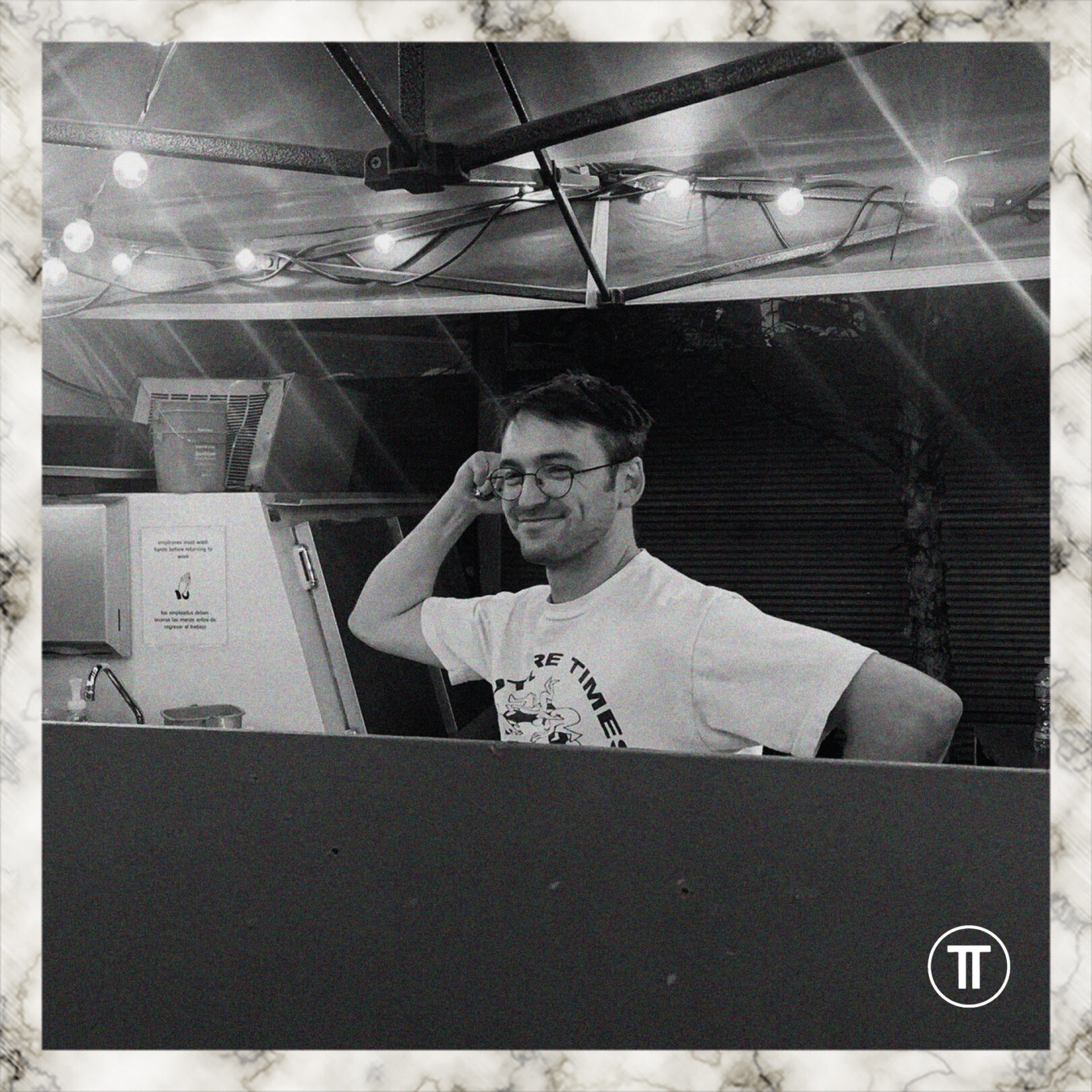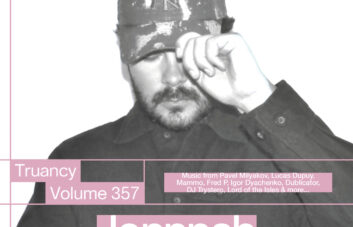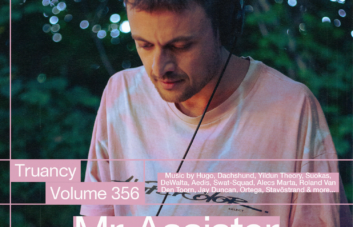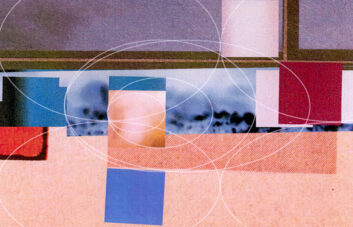For many regular Truants readers and speed-seeking techno connoisseurs, Jackson Ryland of Washington, DC hardly needs an introduction. Beyond the sounds and insights shared in his past Superabundance interview and Seven Plays takeover, the artist’s particular brand of electronic music, marked by driving rhythms and ethereal melodies, has continuously captivated artists and dancers worldwide. Displaying a robust imagination and creative versatility, Jackson Ryland approaches music-making with a childlike curiosity and intuitive lightness, which has led him to collaborate with a diverse set of beloved DC artists in addition to his prolific, multi-genre discography of solo EPs.
Across releases for sought-after labels like 1432 R, Peach Discs, Pleasant Life, and Fixed Rhythms, whilst operating under a number of aliases over the years, the artist has freely explored sonics ranging from breakneck techno at staggering bpm levels, to down-tempo, ’90s chill-out tracks named for his pet cat. Presenting a mix that parallels his energetic DJ sets and fluid recording style, Truancy Volume 298 playfully transitions between house, techno, hardgroove, and electro with flowing ease, for an inspired 90 minutes of music from throughout the decades. In the accompanying interview, Jackson Ryland shares his perspective on the evolution of his sound, his latest EP as JR2k, production methods, recent club experiences, artistic inspirations, and the DC music scene.
Hi Jackson! How are you feeling today and what have you been up to lately? How was your birthday and holiday weekend?! Did you get a chance to work on music? “I’ve been feeling quite chill and peaceful lately, watching movies and petting our cat, thanks for asking. My birthday last week fell on Thanksgiving so Rachel and I had a relaxing walk around DC while the city was empty and had a delicious dinner out and saw our families later over the weekend. Easy peezy, no holiday travel stress.
More people than usual this year told me I look much younger than my age. It’s a nice compliment but it’s had me feeling reflective on how much time I’ve spent conceptualizing and recording music and how much more there is to go. Thoughts of like “maybe I’m hitting the middle of my artistic career. Or will I keep doing this until I physically can’t anymore? Damn.”
So what did I do about it? I recorded two fresh JR2k demo EPs in the span of a week and felt accomplished for the time being.”
What aspect(s) of music making do you find most challenging? On the contrary, which facets of production come most naturally? “Lately I’ve expanded the number of projects I’m recording for (Superabundance, JR2k, Rush Plus) in addition to self-releases and it is a challenge to stay on top of what to prioritize each week or day to day. Maintaining a distinct voice or sound for each project is something I remind myself of often too, because I otherwise might reuse an arrangement or sequence across different projects.
My process for recording and DJing have changed over the last 10 years but right now both feel natural and are still the most fun I experience from this whole thing. It feels fulfilling to trust your own instincts and knowledge and skill either playing out in front of people or alone recording. So I’m happy to be at this place artistically.”
Which element do you feel is most essential in building the atmosphere of your tracks—rhythm or melody? What is your first step in creating new music? “Whatever emotion I’m feeling at the start of the session is usually what the track ends up sounding like. I tend to record downtempo or house music when I’m content or happy. Angst or anxiety leads to a Rush Plus or JR2k sounding techno session and high energy, frantic moments of inspiration make a Superabundance blueprint (usually but not always the case).
From a practical approach, that emotion helps me decide what intensity of drums or rhythm I want to lock into or to skip drums entirely. Then I can hear what sounds I want to lay overtop, like filling in the puzzle pieces so to speak.”
How would you describe your music to someone completely unfamiliar with house or techno? Is there any one visual reference you feel is an accurate representation of your music? “Imagine a body of water that appears calm on the surface but underneath there’s this ripping tide of churning activity going at its own rhythm, maybe even in absolute contrast to life on the surface. That’s how I visualize my music when I close my eyes and listen back at least.”
What role does the city of Washington, DC play in your musical identity? Do you consider your discography to be ‘DC music’? “I think there is a shared kinship amongst DC-based DJs, recording artists, club owners and promoters in that we are all doing our part to create this musical reality for ourselves and the community. Despite having a smaller scale scene compared to other east coast cities, DC is home to a prolific and resilient music community. I’ve certainly built some of my identity around hanging with all the recording artists and people who make events happen here, because we do mutually encourage each other often to keep pursuing our creative avenues.
But is my music “DC music?” That’s not up to me to decide. I listen to all my demos while walking or biking around the city and see how my recording style feels parallel to how rough, unpredictable and shapeshifting DC feels at times.”
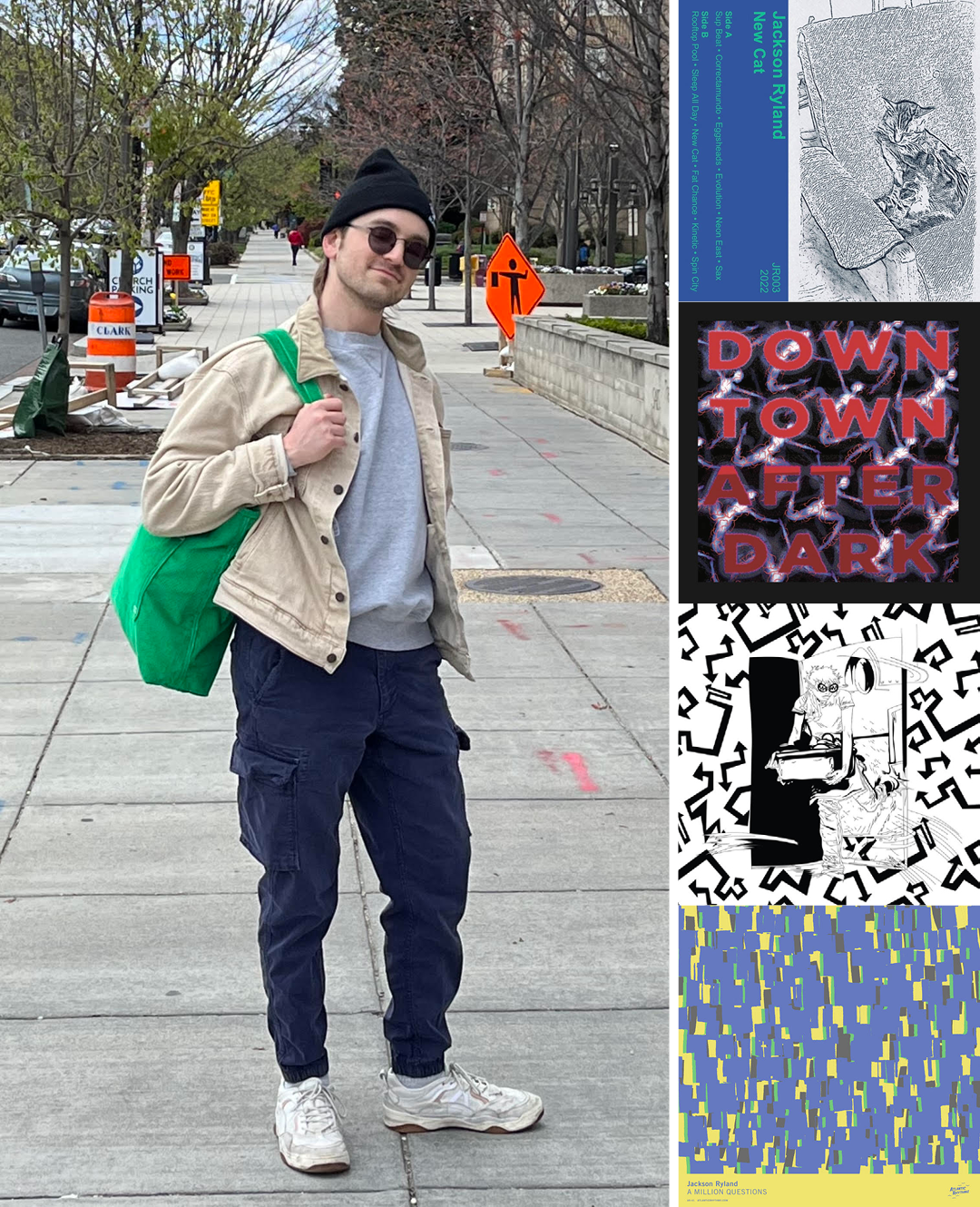
To what degree do your immediate, physical surroundings tie into your productions? Do you think an artist’s location is significant to their music? “The people you surround yourself with do highly influence your musical taste, execution and decisions, absolutely. And I think that goes for wherever you are. My closest musical friends (Jus Nowhere, Max D, Clarisa Kimskii, James Bangura) all have incredible work ethics and artistic visions and that challenges me to stay just as productive. I feel like I can rely on them and call them to talk about anything I’m struggling with and vice versa. And the same goes with my partner, Rachel, and my family. Having that open line of communication to problem solve is imperative to growth.
Living in DC has influenced my music in some intangible ways I believe. I’m usually reaching for an element of funkiness in everything I record. Even with heavier sounding music, a funky rhythm or bassline or cheeky melodic progression can brighten the mood of a track or a dancefloor. It’s hard to explain further but living in DC has left that impression on me of enjoying funkier music rather than rigid or serious.”
What’s your dream artist collaboration? If you could go back in time and interview any artist, who would it be and why? “A studio session with DJ Shufflemaster to learn how to make perfectly swung techno would be epic. That would fulfill a lot of techno dreams of mine.
Recently I’ve been re-listening to The Advent’s discography and thought it would be awesome to interview them in the mid-90s while Mr G was still part of the duo. The first two Advent albums during that era were super inventive pieces of electro/techno that still sound fresh 25 years later. Interviewing them during the height of those albums and their live set touring schedule would be a trip.”
How do you balance production, DJing, and writing, not to mention your day job? Do you find yourself dedicating more time to one artistic practice more than others? “I don’t balance it at all. I’m answering emails and sending out promos for my next releases and rendering a new demo off Ableton up until I leave for work. Fortunately, the attention I’ve received from all these artistic outlets has steadily risen at a pace I’m able to keep up with. But what I’m doing now is not something I would have been comfortable with a few years ago. It’s all a progression and took time for me to acclimate.
I’m definitely a producer first—it’s where I spend more of my time artistically. I find DJing to be an extension of production knowledge in that you choose songs (much like samples or synths or drum machines) based on sounds you enjoy hearing. Putting all those sounds together in a unique way that speaks to you is how I envision DJing from an artistic approach. I’ve never been in high demand as a DJ so it’s never felt like an artistic priority. I’m working actively to change that after playing fun sets recently like 6-hour outdoor at Nowadays and a Rush Plus closing set after Ron Morelli in DC. Those gigs have reminded me recently how much fun DJing is for me. I’m always excited to bring my style.
As for writing…I only enjoy it when I do it at my own pace, never rushing it for a deadline. So that artistic outlet usually takes a back seat most months.”
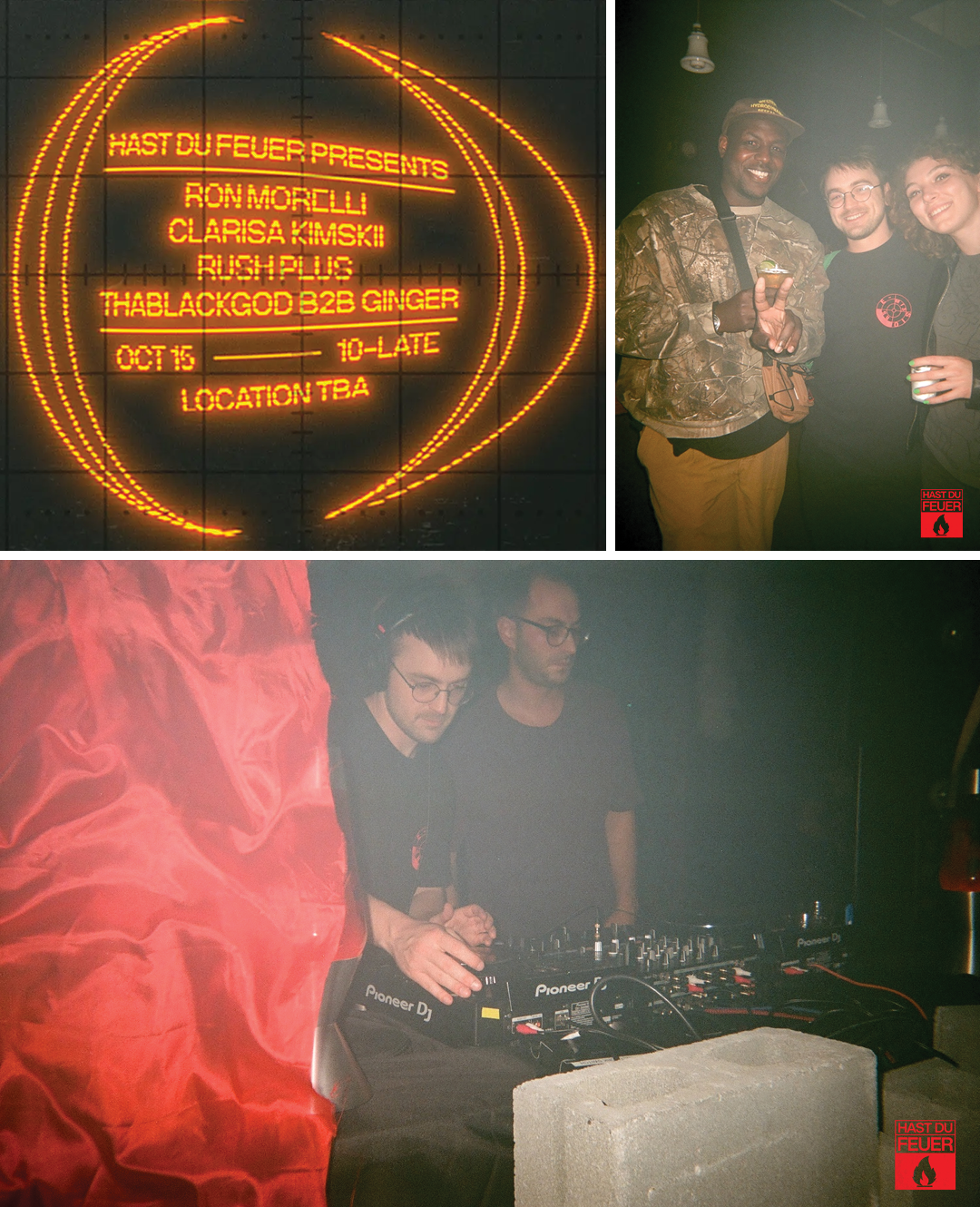
What’s your favorite method of finding new music? Any specific artists or tracks you’ve come across recently that have you particularly excited or inspired? “Favorite method would be going to a record store because it still holds a weight of excitement in possibly finding the unexpected, like a quest. And each store curates its own collection differently, so entering a music store and talking and connecting with the people who manage a store that aligns with your tastes is a validating music experience every time. It’s still talked about among my friends but the Future Times record store played an important role in connecting so many DC, Baltimore and New York dance recording people in the same room while it was open.
I recently came across Oblique Occasions from a Bandcamp email feature. They record chill home listening / lounge-y music out of Baltimore and I’ve played their Terminally Online and Better Than Me albums at home a bunch. Super relaxing and well-produced.
Also I pre-ordered the repressing of DJ Stingray’s Aqua Team LP. Pretty excited to receive that in the mail.”
What is your main source of growth as an artist? How do you push through moments of doubt or artistic challenges? “Learning new recording or djing skills is a significant landmark of growth for me. They help me synthesize a progression to my talents and provide some direction on where I’m headed artistically. Those are exciting moments to notice.
But I do occasionally have several weeks where nothing new is recorded or a month or two without gigs. It’s easy to feel unmotivated and doubt myself or feel directionless during that downtime but reconnecting with and listening to different styles of music usually helps plant seeds of inspiration. Still, the most important thing is to try recording regardless. Even if the session doesn’t net a finish track, it’s still practice and leads to getting me out of a slump.”
What do you want people to remember about your music? Is there a particular mood or feeling you are ultimately trying to evoke? “The mood or feeling definitely changes with each track so that’s open to interpretation. I’d like my music to help folks relax and concentrate on whatever they’re already working on creatively or otherwise, in a complimentary sense. If we’re talking about a nightclub setting, I certainly have more driving, aggressive, “let’s-go” sounding music in my discography.”
If you had one day to show a fellow DJ or producer around Washington, DC for their first time, where would you take them? Where is your favorite place in DC to experience music? “Joint Custody during the day to meet Ambrose and Connor and check out the dance record collection over there. Maybe grab a lil Ethiopian lunch at Dukem or smoke a doobie in Malcolm X Park. Hit up Bangura or Max D and see if they’re down to have a studio jam. Then, provided there’s a dope show that night, they need to see Jimmy Valentine’s in action. It’s still the most intimate, raw example of DC musicians and heads gathering in one spot to hear a special set around here. Too many nights there to remember at this point.”
How would you describe the evolution of your sound over the years? Where do you feel you’re headed next artistically? “I’ve decided to record at different tempos for various projects and with friends like Niko and Jeremy from Bottled Up who come from a live band background taught me a lot about improving during a jam session. Putting out downtempo, house and jungle records all in the same year changed how I view DJing too. Now I can play a set anywhere between 70-200 bpm and still play my own recordings. Endless possibilities. Hopefully this leads to meeting more likeminded producers and interesting record and gig opportunities.”
Are your productions still heavily influenced by video games and OSTs? What recent games have caught your interest? What other worlds outside of music have been a major influence? “I recently recorded on my phone the “club music” played in the nightclubs in Mass Effect 2 and 3 and sampled both those in my recent demos. Some games are more immersive sonically than others, but electronic music OSTs peaked in innovativeness during the late 90s and 2000s era of video game making. N64, Dreamcast and PS2 titles. That’s the era of video game OSTs that grabs my attention most still with interesting approaches to ambient techno, house and liquid DnB.”
Are there any songs or music from your childhood you feel were particularly formative? Are there any albums or artists you continue returning to over the years? “Video games were a constant in my childhood so I was internalizing (likely unconsciously) the influence of great OST music growing up. Like the choppy sound effects from Street Fighter 2 or the character loading screen music in Mortal Kombat 3. I still find the Streets of Rage on Sega Genesis and Jet Grind Radio on Dreamcast to be masterpieces and reflective of the eras they came from. Timeless listening.”
Is there any one release or tracks of yours that makes you feel most proud or accomplished? Was there a particular moment when you felt you’ve ‘found your sound’? “The “Rebirth” track Justin and I released under Rush Plus on E-Missions in 2018 still blows me away. It sounded like a huge leap in our production output at the time and we received a favorable RA Recommends review leading up to the release. That was huge, a defining moment helped us define our sound and put it on blast. It also raised the bar in terms of what we expected from ourselves in terms of quality with every release after that.
After “A Million Questions” came out on Atlantic Rhythms, I started seeing how to pair music better and decide what demos worked for all my various projects after that. That experience helped me find an avenue for all my music for sure.”
What have been some standout moments in your musical career? Have you received any especially good advice from a fellow artist? “I’ve had probably a dozen moments where I’ve been on the dance floor and Ben UFO or Ryan Elliott or a friend mixes in one of my tracks. It feels like what I’m doing comes full circle. I remember all those moments and it feels pretty encouraging, if a bit unsettling, every time.
Best advice I’ve ever received is from Clarisa on a few different occasions: “Your job is to focus on recording dope music.” That advice has influenced me to record a good amount of music over the years when I’ve been unsure of what to do next.”
Anything you would like to mention about the mix, its mood, or intention? Any tracks or artists you want to highlight? “My approach for this mix was to show the different styles I play (house to techno to hardgroove to electro) and how those sounds are parallel to my usual recording styles too. Shoutout Davon Dreamastmoe on his new album out this week. Definitely go check that out.”
What are you most looking forward to in the upcoming months? Any upcoming sets or releases you can mention? What are your goals for next year? “I have a new record coming out on Fixed Rhythms this month; it’s under a new alias, JR2k, meant to show off some of the tougher techno recordings in my personal folder. I’m planning on releasing more of that next year. Rush Plus has a new EP that will be out imminently and more after that. New Superabundance album on the horizon next year.
Rush Plus in Baltimore December 17th. And I’ll be playing solo at Darkroom Baltimore for New Years.
My goals for next year are to continue this pace of releasing music next year and seek out interesting opportunities to play my music live outside of DC.”
Jackson Ryland: Website, Bandcamp, Soundcloud, Instagram
You can download Truancy Volume 298: Jackson Ryland in 320 kbps and see the full tracklist by supporting Truants on Patreon here. Your support allows Truants to continue running as a non-profit and ad-free platform. Members will receive exclusive access to mixes, tracklists, and merchandise. We urge you to support the future of independent music journalism—a little goes a long way.
Photos courtesy of the artist and Hast du Feuer

